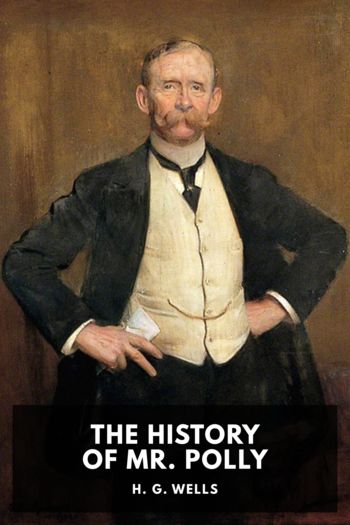Kipps by H. G. Wells (distant reading txt) 📕

- Author: H. G. Wells
Book online «Kipps by H. G. Wells (distant reading txt) 📕». Author H. G. Wells
He coughed and paused. “Wait for the lean years,” he cried. “Wait for the lean years.” And suddenly he fell into a struggle with his cough and spat a gout of blood. “It’s nothing,” he said to Kipps’ note of startled horror.
He went on talking, and the protests of his cough interlaced with his words, and Sid beamed in an ecstasy of painful admiration.
“Look at the fraud they have let life become, the miserable mockery of the hope of one’s youth. What have I had? I found myself at thirteen being forced into a factory like a rabbit into a chloroformed box. Thirteen!—when their children are babies. But even a child of that age could see what it meant, that Hell of a factory! Monotony and toil and contempt and dishonour! And then death. So I fought—at thirteen!”
Minton’s “crawling up a drain pipe until you die” echoed in Kipps’ mind, but Masterman, instead of Minton’s growl, spoke in a high, indignant tenor.
“I got out at last—somehow,” he said, quietly, suddenly plumping back in his chair. He went on after a pause. “For a bit. Some of us get out by luck, some by cunning, and crawl on to the grass, exhausted and crippled to die. That’s a poor man’s success, Kipps. Most of us don’t get out at all. I worked all day and studied half the night, and here I am with the common consequences. Beaten! And never once have I had a fair chance, never once!” His lean, clenched fist flew out in a gust of tremulous anger. “These Skunks shut up all the university scholarships at nineteen for fear of men like me. And then—do nothin’. … We’re wasted for nothing. By the time I’d learnt something the doors were locked. I thought knowledge would do it—I did think that! I’ve fought for knowledge as other men fight for bread. I’ve starved for knowledge. I’ve turned my back on women; I’ve done even that. I’ve burst my accursed lung. …” His voice rose with impotent anger. “I’m a better man than any ten princes alive! And I’m beaten and wasted. I’ve been crushed, trampled and defiled by a drove of hogs. I’m no use to myself or the world. I’ve thrown my life away to make myself too good for use in this huckster’s scramble. If I had gone in for business, if I had gone in for plotting to cheat my fellow men—ah, well! It’s too late. It’s too late for that, anyhow. It’s too late for anything now! And I couldn’t have done it. … And over in New York now there’s a pet of society making a corner in wheat!
“By God!” he cried hoarsely, with a clutch of the lean hand. “By God! If I had his throat! Even now I might do something for the world.”
He glared at Kipps, his face flushed deep, his sunken eyes glowing with passion, and then suddenly he changed altogether.
There was a sound of tea things rattling upon a tray outside the door, and Sid rose to open it.
“All of which amounts to this,” said Masterman, suddenly quiet and again talking against time. “The world is out of joint, and there isn’t a soul alive who isn’t half waste or more. You’ll find it the same with you in the end, wherever your luck may take you. … I suppose you won’t mind my having another cigarette?”
He took Kipps’ cigarette with a hand that trembled so violently it almost missed its object, and stood up, with something of guilt in his manner as Mrs. Sid came into the room.
Her eye met his and marked the flush upon his face.
“Been talking Socialism?” said Mrs. Sid, a little severely.
Six o’clock that day found Kipps drifting eastward along the southward margin of Rotten Row. You figure him a small, respectably attired figure going slowly through a sometimes immensely difficult and always immense world. At times he becomes pensive and whistles softly. At times he looks about him. There are a few riders in the Row, a carriage flashes by every now and then along the roadway, and among the great rhododendrons and laurels and upon the greensward there are a few groups and isolated people dressed in the style Kipps adopted to call upon the Walshinghams when first he was engaged. Amid the complicated confusion of Kipps’ mind was a regret that he had not worn his other things. …
Presently he perceived that he would like to sit down; a green chair tempted him. He hesitated at it, took possession of it, and leant back and crossed one leg over the other.
He rubbed his under lip with his umbrella handle and reflected upon Masterman and his denunciation of the world.
“Bit orf ’is ’ead, poor chap,” said Kipps, and added: “I wonder.”
He thought intently for a space.
“I wonder what he meant by the lean years?”
The world seemed a very solid and prosperous concern just here, and well out of reach of Masterman’s dying clutch. And yet—
It was curious he should have been reminded of Minton.
His mind turned to a far more important matter. Just at the end Sid had said to him, “Seen Ann?” and as he was about to answer, “You’ll see a bit more of her now. She’s got a place in Folkestone.”
It had brought him back from any concern about the world being out of joint or anything of that sort.
Ann!
One might run





Comments (0)